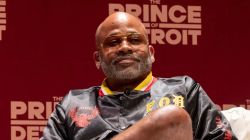So, you say you want to start your own label and bring the boom-BAP back to the masses? Well, I had the chance to sit down and chat with Matthew Marcus, president and founder of New York City-based Major League Records. Founded in 1999, Major League has proved itself up to the task of bringing the underground sound to the masses. Although times are hard for major labels, the little guy may well profit from the demise of the proverbial urban music dinosaurs. Do you think you have what it takes? During our conversation Matt gave me a few pointers to pass on to you would be ballers.
“The first and foremost thing you want to do is get your money together,” said Marcus. “Capital is by far the most important thing you need because without that you really cannot be effective with what you’re doing. So, go out and raise your money, even if it’s a small amount of money, and really develop your plan before you spend any of that money. Decide what you want to do and what markets you want to hit. Decide what kind of label you want to be and then get with the people that are doing it. You need to get in the game. You cannot be an outsider and think you’re just going to start up a label. You have to see and learn from people, and then take it from there.”
Money makes the world go round, but getting the loot may prove the easier of many Herculean tasks that befall those that dare venture into indie ownership. Next…is the marketing part. Oh, be afraid! Be very afraid.
“I think, in the case of Major League, we’re in an odd position because we are an indie label, but our music is a little bit more mainstream than a lot of the alternative music that is out there right now. I think that’s how we, personally, stay competitive. Generally, I think it’s about finding good artists, finding great producers and establishing a good brand for your company. All those things are really key. I hate to say ‘oh, we’re indie, we’re underground or mainstream. Good music is good music. If it’s hot it is, if it sucks it sucks. Of course, you have to know your market.”

AD LOADING...
So, what defines a label being indie. Well, once again, the answer points toward mean joe green, not the herbal kind either.
“I think the very definition of indie is your lack of money and your distribution, which has been a challenge for us from the start. As you grow and develop your artist, brand and label name, it gets easier and easier because, the more records you put out, the more staying power you have with your distributors. There are also different routes to go: you can distribute yourself; you can do P&D deals where the distributor actual lays out money for you, but it really depends on your company’s direction.”
As you may know, getting airplay for a single is one of the most important ingredients for marketing success, especially if the music is hot, but radio ain’t what it used to be. Once a reflection of all that was hot in its geographic area, these days radio is pimped by industry giants. So, is getting your joint on radio mission impossible? Or is it only mission very, very difficult?
“Radio is tough, it’s really hard. The first market you have to attack when getting your product out there is college radio. It’s going to expose your records to the young tastemakers. The cats that are going to be running the Hot 97s of the future. For an indie, that’s a great place to start. We do get a lot of our product played on the radio, but that’s the result of the relationships we’ve formed with individual producers and DJs who can go to their PDs and let them know we’re hot. At the end of the day, it’s pretty much a money issue.”

AD LOADING...
When it comes to signing hot acts, a good ear is your best asset.
“I think my ear is developing and it will always be developing. I got into this because I felt like I had the ear to do it. So, I signed Tribeca after hearing 15 seconds of the first demo he gave me. You get inundated with demos and I personally listen to everyone, but, the point is, the more you listen to the more you will be able to say who’s wack, who needs to work on lyrics, who needs to work on their production, and so on. Unfortunately, the majority we get will never get touched.
We started with an artist by the name of Cash Brown, but we were personal friends with a good rapport. But Tribeca has really brought us out to the forefront. We signed a deal with ESPN for Tribeca–who does the theme song for the hoop dream style reality show ‘Life In The D-League‘- and it was very strong for us. Now that has opened up a lot of cable licensing things for us and more record sales; which goes without saying. So, we put all that around Tribeca. He’s the cornerstone of this label. We’re not going to spread out wings and sign 20 different acts until we get him where we want him to go.
Wait-a-minute! Not everyone who picks up the microphone does it for the love. In fact, dreams of riches are what push many subpar talents into the game prematurely. If you sign to Major League you won’t be rich overnight, but it may be a better deal on the back end in relation to big label upfront advances.

AD LOADING...
“Our deals have small advances, but much larger back ends. I won’t speak in specifics, but it turns out to be a much stronger deal. We want to really make the artist partners. We want everyone who signs with us to get that family feel and the first place to get that is on the dollar and cents end of it. If you’re including your artists in your profit sharing then it’s easier to negotiate with people and it makes for a better relationship for everybody.
So, still think overnight riches are within your grasp? You better check yourself. It’s a lot of hard work. And, after all that hard work, you may still have to look for help from the big dogs at the end of the day.
“We’re going to try to build this as far as you can go, but I think, at the end of the day, if your goal is to have your music, brand and artist meet as many people as you can then you have no choice but to go the major route. It is very, very hard to stay wholly independent if you will really want the masses to hear your material, but my goal in the short term is to thug it out as much as we can.
If you have a vision for what you want to do and the strength to go after than vision and implement it every day, then go for it. Because if anyone thinks that this shit happens overnight they’re mistaken. If it does happen overnight then you’re the luckiest guy in the world. This is hard work, day in and day out. It’s not luxurious, but the upside is very high. My advice to the would be a record mogul is to start as young as you can. The older you get the harder it will be to accomplish your goals.



